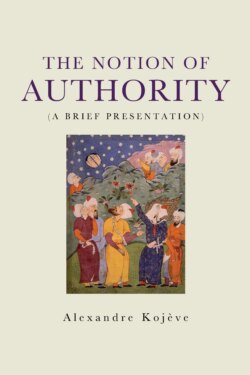The Notion of Authority

Реклама. ООО «ЛитРес», ИНН: 7719571260.
Оглавление
Alexandre Kojève. The Notion of Authority
Отрывок из книги
The Notion of Authority
(A Brief Presentation)
.....
Coming back to the four philosophies mentioned above, Kojève notes their correspondence to four pure types of authority. That of the master is in line with Hegel’s thought and with the relation between master and slave, which is, apparently, considered a ‘general theory of authority’, even though it does not account for the authority of the father, leader, or judge types. Following Aristotle, another type of authority becomes central – that of the leader who is more apt than others to foresee, who is more intelligent and intuitive; the leader is he who conceives of a project and who guides and commands. Platonic thought is again different, every authority being founded, or needing to be founded, on justice or equity. In this respect, it is the authority of the judge that is central and exclusive. Thus, it is ‘the claim to impartiality, objectivity, disinterestedness, and so on, that always gives rise to an authority’. Similarly, the ‘“just” or “honest” man possesses an unquestionable authority, even if he does not hold the position of an arbiter’. The scholastic or theocratic theory, itself having a universal and exclusive dimension, corresponds to the authority of the father, which is in reality, like the three other types of authority, endowed with a divine essence because its authority is derived from God via the transmission of hereditary essence. ‘God the Father’, ‘our Father which art in heaven’ considered as ‘creator of man and the world’, ‘“Father of men” because he has effectively “engendered” them by “creating” them (ex nihilo).’
Despite the fact that each of these philosophical theories aspires to exclusivity, none of them manages, according to Kojève, to account for the four pure types of authority. This line of analysis leads him to take for granted the plural aspect of authority. Consequently, all controversies ensuing from the dominating tendencies are repressed. And it should not be forgotten that the retained typology, reminiscent of Weber’s theory of ideal types, does not exclude in any way the possibility of multiple combinations – each simply marked by the predominance of one of them. Kojève even drafts a comprehensive list of all the possible types of authority, refining once again the phenomenological approach by distinguishing ‘the total authority, which encompasses all four pure types’ from ‘selective authorities, which integrate only one, two or three of these types’, every concrete authority being ‘in fact, more or less total.’ ‘Obviously, absolute authority in the strong sense of the word is never realized in fact. Only God is held to possess it (or more precisely, God should have possessed it)’ [p. 31].
.....